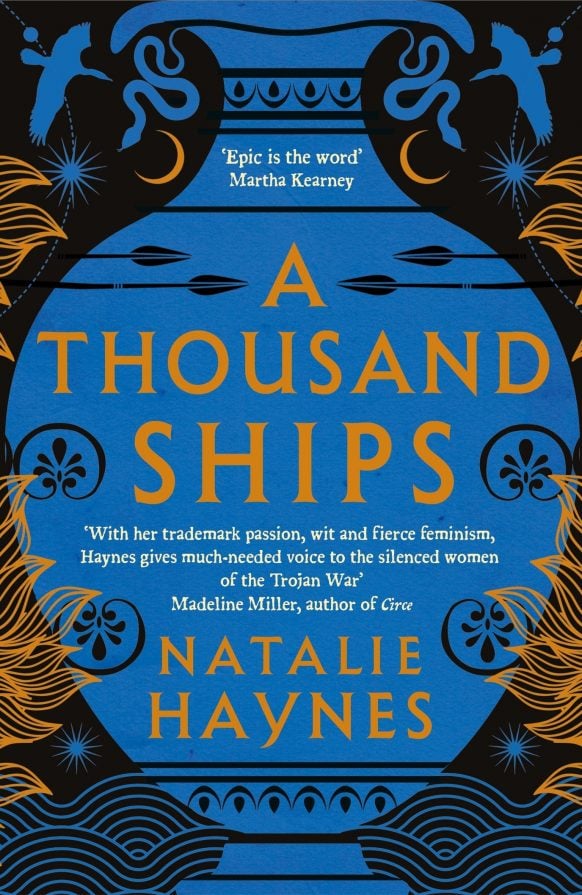A Thousand Ships by Natalie Haynes
The twenty-year voyage of Odysseus, king of Ithaca, is an archetypal tale of bravery, cleverness and cunning, the saga of a wily hero among a cast of heroes, Greek and Trojan. The Greeks’ ten years of siege and war against Troy, then ten more years of Odysseus’s return to his homeland, celebrate what it means to be a hero.
In Homer’s epic, the heroes’ deeds exist in the context of the women and girls they kidnap, enslave, rape and murder; marry and abandon; the goddesses who protect or persecute them; the nymphs they marry (and destroy or abandon); the sorceresses who further their stories; the muse who sings of their feats. Each woman is a triggering mechanism of the warriors’ hero-making adventures.
In Book 1 of The Odyssey, the (teenaged) Telemachus tells his mother (Penelope, wife of absent Odysseus): “go to your quarters now and attend to your own work, the loom and the spindle, and tell the servants to get on with theirs. Talking must be the men’s concern, and mine in particular; for I am master in this house.”
Similarly, The Odyssey is Odysseus’s ‘concern’.
Natalie Haynes has extracted her cast of women from Homer’s Odyssey and Iliad; Virgil’s Aeneid; Ovid’s Heroides; Aeschylus’s Oresteia; Euripides’ Trojan Women; Hecabe; Iphigenia in Aulis and Iphigenia Among the Taurians and, despite Telemachus, given each back her voice.
The muse, Calliope; Penelope, the wife who waits; Clytemnestra, avenging her husband’s murder of their daughter to win favourable winds; the sacrificed Iphigenia; the Amazon warriors; doomsaying prophetess Cassandra; sea nymphs; sirens; goddesses; Helen herself; slaves, handmaidens, queens, princesses, mothers and daughters, victims and avengers, even the three sisters who are the Fates. What heroic tale that the boys call their own could ever be told without them?
In alternating chapters, each woman speaks in her own voice of irony, revenge or resignation, recounting her own thoughts and actions as she watches, reacts and remembers; the realistic other side.
Penelope writes: “Odysseus, I honestly don’t know where to begin. But since you are surely dead by now, I don’t suppose it can matter very much. I might as well be howling these words into an abyss … . This just gets better and better. Ten years waging war against one city with all the forces Greece could muster alongside you. It sounds ridiculous, doesn’t it? And that is the most defensible part of your absence. Ten years of war, followed by three solid years wandering about the high seas, failing to come home with one excuse after another. You met a monster. You met a witch. Cannibals broke your ships. A whirlpool ate your friends. Telemachus himself would never have come up with such excuses and he was a boy. Not any more, of course. Now he is twenty. … And now seven more years – seven!”
The muse, Calliope, knows that men just don’t get it: “I took him [the poet] straight to the shore so he could see what happened to the women who did escape the fires [of Troy] and he didn’t even notice that the survivors were hardly any better off [than those who died in the flames] … . I’m not sure I could have made it more obvious, but he hasn’t understood at all. I’m not offering him the story of one woman during the Trojan War, I’m offering him the story of all the women in the war. Well, most of them (I haven’t decided about Helen yet. She gets on my nerves). I’m giving him the chance to see the war from both ends: how it was caused, and how its consequences played out. Epic in scale and subject matter.”
Natalie Haynes is a BBC Radio broadcaster, (prize-winning) author and historian.
(Mary Beard’s book, Women & Power, is a survey of women’s public voices in the arts.)
Reviewed by Judith Elen
Find this book in SMSA Library

